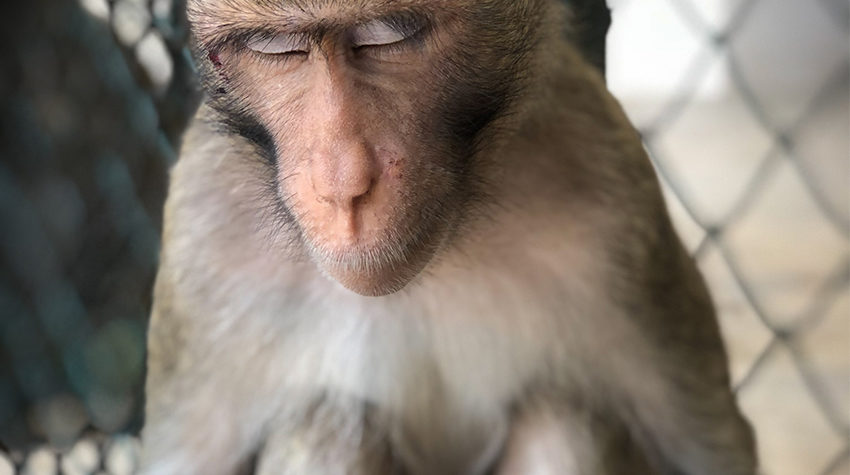
April 05, 2022Animal Law & Policy Clinic, Media ReleaseUSDA Sued Over Secret Inspection Policy
For immediate release: 5 April 2022
Harvard Law School’s Animal Law & Policy Clinic filed a lawsuit against the United States Department of Agriculture (USDA) today [Tuesday, April 5] on behalf of Rise for Animals and the Animal Legal Defense Fund for implementing a secret policy that evades its statutory obligation to conduct full annual inspections of research facilities as required by the Animal Welfare Act (AWA).
Under the secret policy—uncovered by the Harvard Clinic under the Freedom of Information Act (FOIA)—if a facility is accredited by the industry-dominated Association for Assessment and Accreditation of Laboratory Animal Care (AAALAC International), the USDA instructs its inspectors not to conduct a full annual inspection of the entire facility and all the animals kept there as the agency has traditionally done for years, and as is required by the AWA. Instead, inspectors are instructed to inspect only a single portion of the facility—either the animals, the actual facility, the paperwork that must be maintained, or a sample of any one of these aspects. This means that for AAALAC-accredited research labs—which make up the majority of labs doing research on animals in this country—federal inspectors only need to check whether a sample of records are on file and never look at a single animal to ensure that the animals used by the lab are being treated humanely and in compliance with all applicable AWA standards.
The policy came to light when the Harvard Clinic challenged the USDA’s failure to improve the outdated 1991 standard to “promote the psychological well-being of primates” used in research, and the agency defended its decision on the grounds that the agency inspectors “examine and document all areas of care and treatment that are covered” by the AWA.
The FOIA documents revealed that the USDA’s Animal Plant Health Inspection Service (APHIS) not only mandated that its inspectors no longer fully inspect AAALAC-accredited facilities each year, but they may not even ask for proof that the facility’s accreditation is current. This means that even labs that are on “probation” from AAALAC for serious problems regarding their treatment of animals do not receive a full inspection. The documents also reveal that APHIS instructed its inspectors not to disclose the new inspection policy to the public.
“Congress passed the Animal Welfare Act decades ago in response to shocking failures of self-policing in animal research. By implementing this secret policy, the USDA has abandoned its legal duty to actually inspect research facilities, putting good science and countless animals at risk of a return to a pre-AWA world,” said Max Hantel, a Harvard Law School student who helped draft the lawsuit under the supervision of Clinic Director Katherine Meyer.
Stephen Wells, executive director and CEO of the Animal Legal Defense Fund added: “The USDA has deliberately kept secret a policy that allows the agency to thwart the AWA at the expense of the animals that the law was put in place to protect. It’s unacceptable for the USDA to outsource its responsibility to an industry association.”
In 2018, the USDA proposal to use third party accreditation via private organizations as a basis for reducing inspection frequency was met with public outcry. Commentators in opposition to this proposal pointed specifically to AAALAC being a private organization, unaccountable to the public, with its own standards that differ from the AWA. In a peer-reviewed study submitted to the agency, researchers showed that AWA violations actually occurred at a higher rate in AAALAC accredited facilities than in non-accredited ones. In response to overwhelming objections to the proposal, APHIS announced that it would not defer to such accreditation in deciding the thoroughness of inspections. However, in February 2019, the agency issued secret guidance to its inspectors, which required only partial inspections of facilities at any AAALAC accredited facility.
The lawsuit asserts that the secret policy violates the plain language of the AWA, which states that the USDA “shall inspect each research facility at least once each year and, in the case of deficiencies or deviations from the standards promulgated under this chapter, shall conduct such follow-up inspections as may be necessary until all deficiencies or deviations from such standards are corrected.” The suit also claims that the agency’s decision to adopt the policy was arbitrary and capricious and an abuse of discretion because it means the agency has no idea if labs are complying with all the requisite standards, and because the public had already overwhelmingly opposed the adoption of such a policy, which greatly weakens the AWA protections intended to “ensure the humane treatment” of animals used in research.
***
Notes to Editors:
Even facilities on probation for sever animal welfare issues are not being thoroughly inspected and keeping their accreditations. The University of Wisconsin-Madison, as a recent example, has had severe animal welfare problems over the past 6-months, including an adolescent macaque found dead in an enrichment device, an adolescent macaque escaping from its enclosure and becoming injured, improper administration of medications to two macaques, failure to administer medication to an adult macaque who had suffered from an unknown tail trauma, and death of a dozen mice from failure to provide water. AAALAC was notified of each incident, yet the University remains an accredited member.
***
To interview attorneys from Harvard Law School’s Animal Law & Policy Clinic, Rise for Animals, or the Animal Legal Defense Fund contact: Sarah Pickering: [email protected], 617 852 6484
